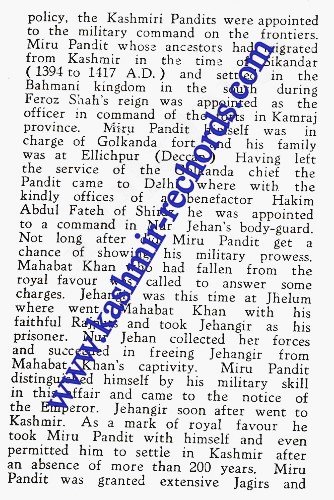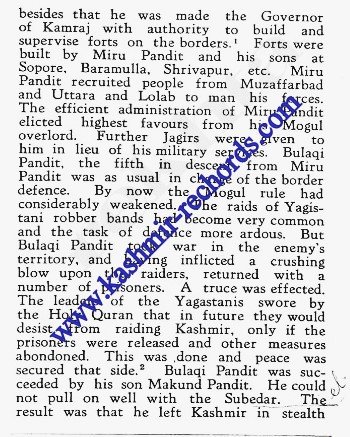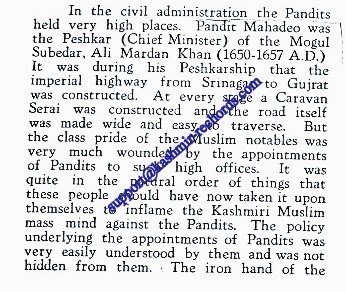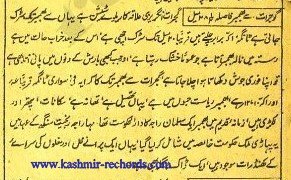Kashmir Rechords Exclusive)
In the annals of Kashmir’s rich history, few figures stand out as vividly as Miru Pandit, a man who bridged the ancient wisdom of his homeland with the demands of a changing world. During the Mughal era, as Kashmir’s cultural and intellectual heritage was woven into the fabric of the empire, men like Miru Pandit with his military prowess played a crucial role in preserving and adapting this legacy. His resilience and intellect made him a beacon of his culture, embodying the strength and adaptability of the Kashmiri Pandit community.
Kashmiri Pandits and Mughal Empire
The Kashmiri Pandits were recognized by the Mughals as the “most respectable class,” often attracting the attention of rulers like Akbar, who valued their knowledge and integrity. This high regard is documented in several historical texts on Kashmir, including Pt Jia Lal Kilam’s “History of Kashmiri Pandits.” Although Pandits rarely reached the highest ranks of power, they were often appointed as Peshkars (administrative officials) to the Mughal Subedars. Unlike Muslims, who dominated the army’s upper echelons, Pandits were entrusted with defending volatile border regions—a significant responsibility that highlighted their capability and loyalty. This trust extended to the appointment of Rajput generals to govern Kabul and the military roles assigned to Kashmiri Pandits on the frontiers.

Early Life of Miru Pandit: From Kashmir to Deccan
Miru Pandit’s story begins during the reign of Sikandar (1394-1417 A.D.), when his ancestors migrated from Kashmir to the Bahmani kingdom in South India during Feroz Shah’s rule. Serving as an officer in command of forts in Kamraj province, with his family settled in Ellichpur (Deccan), Miru Pandit eventually left the service of the Golkanda chief and moved to Delhi. There, with the assistance of Hakim Abdul Fateh of Shiraz, he was appointed to a command position in Noor Jehan’s bodyguard.

Miru Pandit’s Bravery in Mughal History
Miru Pandit’s military prowess was brought to the forefront during a pivotal moment in Mughal history. According to “Tarikhi Aqwami Kashmir,” when Mahabat Khan, who had fallen out of favor, captured Emperor Jehangir at Jhelum, Noor Jehan rallied forces to free her husband. In the ensuing conflict, Miru Pandit distinguished himself through his skill and bravery, catching the Emperor’s attention. As a mark of royal favor, Jehangir invited Miru Pandit to return to Kashmir, where he was granted extensive jagirs and made the Governor of Kamraj. His duties included building and supervising forts at strategic locations like Sopore and Baramulla. To man these fortifications, Miru Pandit recruited forces from Muzaffarabad, Uttara Machi (Handwara), and Lolab, earning further rewards from the Mughal overlords for his efficient administration.

Legacy Continues: Bulaqi Pandit and the Defence of Kashmir
The legacy of Miru Pandit continued through his descendants. As noted by author Krishna Dar in the “History of Dar Family,” Bulaqi Pandit, Miru Pandit’s descendant, took charge of defending Kashmir’s borders. By this time, Mughal rule had weakened, and raids by Yagistani tribes had become more frequent and severe. Bulaqi Pandit responded by taking the fight to the enemy’s territory, dealing a crushing blow and securing a truce. The Yagistani leaders swore by the Holy Quran to cease their raids on Kashmir in exchange for the release of prisoners, bringing peace to the region.
Bulaqi Pandit was succeeded by his son, Makund Pandit, who, unfortunately, could not maintain a good relationship with the Subedar of Kashmir. This led to his departure from the Valley. Leaving his family in Kishtwar, he traveled to Delhi, where he presented his grievances to Emperor Mohammad Shah. The Emperor received him warmly, granted him a Khillat (robe of honor), and assigned him to the revenue administration. Although the command of the forts was transferred to another, the Pandits’ connection with the army persisted, with some joining the Sikh and Maratha armies, continuing their tradition of military service.
Mahadeo Pandit in Civil Administration

During the Mughal era, Kashmiri Pandits also held significant positions in civil administration. One notable figure was Pandit Mahadeo, who served as the Peshkar (Chief Minister) to Mughal Subedar Ali Mardan Khan (1650-1657 A.D.). Documents from this period reveal that during Mahadeo’s tenure, the imperial highway from Srinagar to Gujarat was constructed, complete with Caravan Sarais at every stage, making the road wide and easy to traverse.
Enduring Spirit of Kashmir’s Ancient Culture
Miru Pandit and his descendants symbolize the resilience and adaptability of the Kashmiri Pandit community. Despite the challenges and shifting political landscapes, they maintained their integrity and continued to serve with distinction in both military and civil capacities. Their story is a testament to the enduring spirit of Kashmir’s ancient culture, carried forward by those who bore its torch through the storms of time.